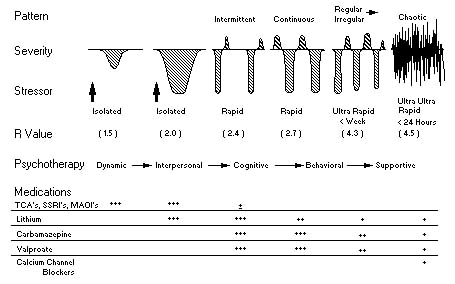
| FIG. 5 |
 |
| In an analogous fashion to kindling, episodes of mood illness may progress from triggered (arrows) to spontaneous and show different patterns and frequencies (top row) as a function of stage of syndrome evolution. Just as different neural substrates are involved in different phases of kindling evolution, a similar principle is postulated in mood illness; these phases might also be responsive to different types of pharmacotherapies or psychotherapies. Although systematic and controlled studies have not examined the relationship of the illness phase to treatment response, anecdotal observations provide suggestive data that some treatments may be differentially highly effective (+++), moderately effective (++), or possibly effective (+) as a function of course of illness. Note that the pharmacological dissociations in the nonhomologous model of kindling (Fig. 4) are different from those postulated in mood illness; nonetheless, the principle of differential response as a function of stage may be useful and deserves to be specifically examined and tested. The use of multiple agents in combination as a function of late or severe illness stage is standard in many medical illnesses and also should be studied systematically in the refractory mood disorders. |
| Back to Chapter |
published 2000